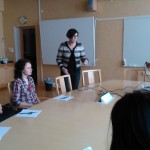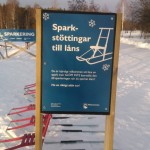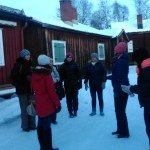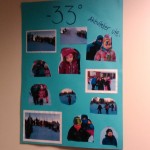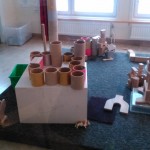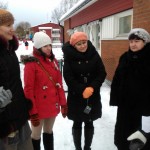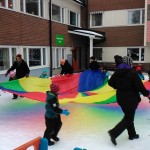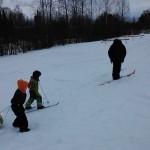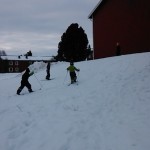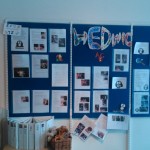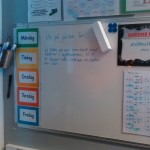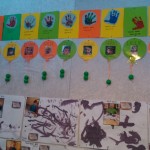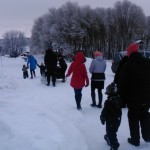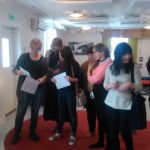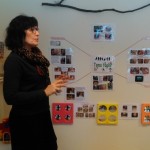Griškānu Pre-school education institutions' impressions on visiting in Sweden
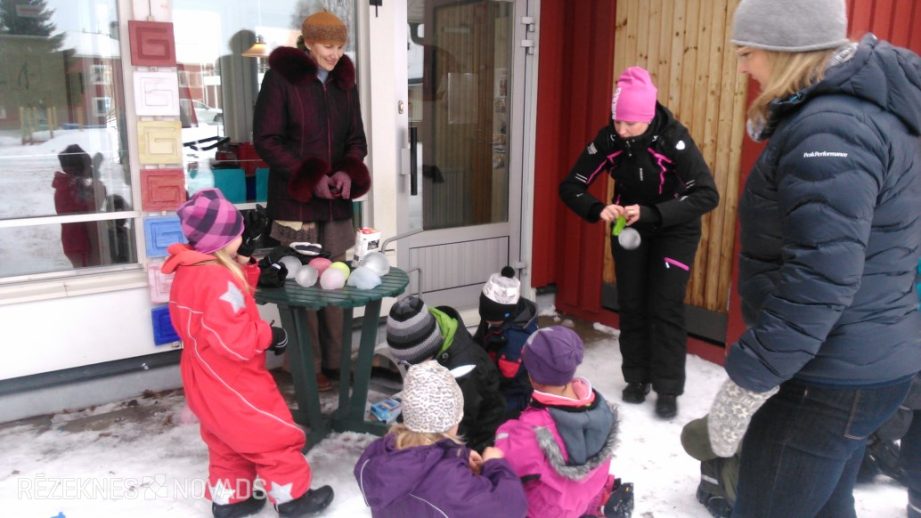
From 7 February to 14 February, the Rēzekne municipality is led by representatives of the pre-school educational institutions in the project NORD PLUS “Be Active, be Creative, be in Nature”, as part of NP JR - 2015/10087, visited the Swedish city of Pitea. The purpose of the visit was to meet the pre-school system in Sweden. We were interested in particular things: liberty pedagogy, the development of child self-service skills, self-sufficiency, children's growth through their experience, creativity and physical activity.
These days were very interesting. We met with mixed, warm people who were willing to share their experience. We had a chance to walk around the beautiful city, meet Swedish culture, traditions, human life. Swedish, especially those living in the north, where there is a real winter with snow coupons and an island up to -33 °C, is much more time for sport and outdoor activities, both individually and in sport with the family. They hide a lot, skating and shouting with special ragava “Sparkering”. These conditions also affect how children spend outdoor walks in a pre-school educational institution. Children are out from 3 to 4 hours a day, skiing, visiting with raggins, experiments with snow, ice, and simply playing, cooking in snow.
Parents provide special, convenient overalls and footwear for children. It was astonished that children are swallowed because, for example, sweaters and shawls are dressed only when there is a big cold outside. In each dressing room, the children have an instruction - a drawing that you need to wear when you walk outside.
Children are dressed completely self-sustaining, they decide whether they need gloves or buttoning all the buttons up to the neck. For the most part, when the children went walking, we could see that the necks had been covered.
Children have a very well-trained skills to handle skis (drifting, landing, skill and skip). Given that the pre-school age in Sweden is from one year to 5 years, it was surprising for us.
Colleagues were very welcome to the local authorities, the educational administration and the education system in the country. In Sweden, education is at first place, as the government believes that educated people are able to boost their growth faster.
Pre-school age is 1 year to 5 years, six-year-old children undergo a preparatory phase at school. Children have been given 5 hours of training per day, then an extended group.
Children learn through their experience playing. There is no special activity network in Sweden, but at the same time children draw, create, install, design, operate with scissors, count, write and speak very well. I think they don't have a problem with the pronunciation. As children do not have a specific regime, the daily rhythm is organized very close to home conditions, without hurry and stress.
There are 23 children in the group, but they are working on small groups. Children, when they come to the institution in the morning, choose their own business for the day. At the time of the day from On 6 morning up to 18 evening, three teachers are working with children, each with 8 working hours. The teacher's assistant does not exist as a state unit. Children do not sleep for a day if only exceptionally, at the request of their parents.
Each child shall be selected by a nomination - Montesori or Regio Emilia. In recent years, the Swedish national setting in education is to raise young scientists and researchers. The main objective is to discover, understand the world in different ways. The child is planning his work from the baby.
Very surprised children's self-service skills. Children in Sweden can not only be dressed, dressed, follow their faces, body cleanliness, but also serve themselves at the time of catering, placing themselves as much food as they can eat. Even two-year-old children eat a knife and fork.
By participating in the project, we noted and decided to take over many interesting things from Swedish colleagues, combining it with our programme and day-to-day regime. One of these is the self-service and meals of children. We bought kids special spoons, bills to make it easier to take food. The children are offered a variety of salad and fruit. I would like to note that we adults sometimes think that children will not succeed, but there is a different scene in real life. Children are delighted to serve themselves, choose the food they taste.
The teacher's conclusion: the two-year-old child, who had always brought back full dishes after meals, is now eating everything. Yes, he might not eat sauce, but he would be willing to eat soup, potatoes with several types of salad and have eaten. Children are offered a choice.
They also receive the protein, carbohydrate, fat and kiloalorium norms laid down in THE CABINET regulations, and the fee for the feeding of children shall be the same amount.
I would like to thank my Swedish colleagues for their lovely experience, affection and hospitality. Also, thank you very much to the municipality of Rezekne and the educational administration for the opportunity to participate in the project, thanks to the precursors of the pre-school education to Biruta Raiva and the supervisor of the project Iveta Tiltiana for the time spent together and interesting impressions.
Svetlana Khalifa,
Griškānu Head of the pre-school educational institution
